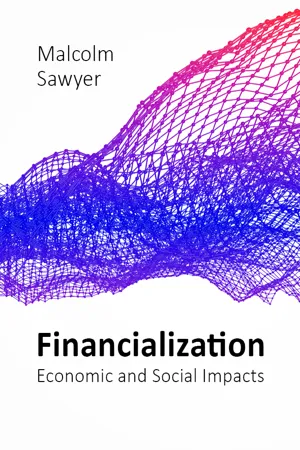
- English
- ePUB (mobile friendly)
- Available on iOS & Android
About this book
Finance has long been an integral part of the capitalist economy, yet since the 1970s the realm of finance has burgeoned, reaching well beyond its traditional funding roles. Finance now reaches into all aspects of economic life from the everyday activity of the individual, to the behaviour of corporations and the decisions made for society as a whole. The power and fragility of the financial sector are seen by the simple fact that when things go wrong, it can bring down banks, currencies, and governments, plunging countries into generations of debt and hardship.
Malcolm Sawyer offers a comprehensive survey of the impact of financialization on economic growth and society. The book draws on and distills a remarkable range of research to provide readers with a guide to current thinking about the place of finance in the wider macroeconomy and considers the prospects for definancialization and a future role that is less pervasive.
Frequently asked questions
- Essential is ideal for learners and professionals who enjoy exploring a wide range of subjects. Access the Essential Library with 800,000+ trusted titles and best-sellers across business, personal growth, and the humanities. Includes unlimited reading time and Standard Read Aloud voice.
- Complete: Perfect for advanced learners and researchers needing full, unrestricted access. Unlock 1.4M+ books across hundreds of subjects, including academic and specialized titles. The Complete Plan also includes advanced features like Premium Read Aloud and Research Assistant.
Please note we cannot support devices running on iOS 13 and Android 7 or earlier. Learn more about using the app.
Information
Table of contents
- Cover
- Half Title
- Title Page
- Copyright Page
- Contents
- Acknowledgements
- List of figures and tables
- 1 Introduction
- 2 The terrain of financialization
- 3 Financialization, neoliberalism and globalization
- 4 The characteristics of (variegated) financialization in the present era
- 5 The global reaches of financialization
- 6 Financial liberalization and financial crisis
- 7 Financialization of the corporation and the pursuit of shareholder value
- 8 Financialization: a driver of inequality or an enabler?
- 9 Financialization of the everyday
- 10 Has the financial sector become too big and dysfunctional?
- 11 The future of (de)financialization
- References
- Index